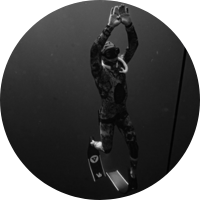
 Christian Daehler
Spearo - Instructor - Freediver
Christian Daehler
Spearo - Instructor - Freediver

 Christian Daehler
Spearo - Instructor - Freediver
Christian Daehler
Spearo - Instructor - Freediver
How should you manage a shark encounter while spearfishing? What are the recommended actions and precautions in such situations? Christian Daehler, an experienced diver, Alchemy spearo, and PFI freediving instructor, offers a comprehensive guide on how to handle shark encounters while spearfishing in the shark-populated waters of Florida.
Here in Florida we have a lot of different species of sharks and they are all over our waters. So they make the process of landing fish that we've shot a little bit of a challenge. So over the years we've adopted techniques that we use to land fish more successfully and I thought I would share some of those with y'all today. Number one, maintain a presence in the water around the fish you've just shot, number two, dive with a team oriented mindset, number three, understand the risks associated with spear fishing around sharks, and then four, know when it's time to pack up and switch spots. Let's jump right into it and break those down.
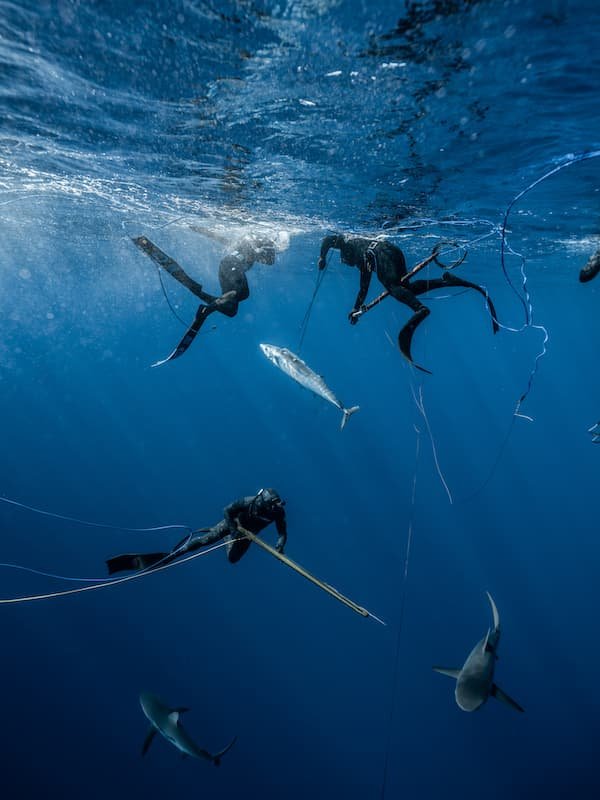
What we've learned spearing around sharks down here is that while sharks are apex predators they are capable of hurting us and they are capable of stealing our fish, the vast majority of times they are opportunistic predators who are only looking for an easy meal. And if you are there to contend them for that fish, even in a small way, that is going to be a critical part in landing fish. So what I mean by maintaining a presence in the water around the fish you've just shot is get as close to it as possible. The best bet is you get that fish in your hands, if you can't get the fish in your hands try to keep it as close to you as physically possible, because having any sort of presence in the water around the fish broadcasts to the sharks that this is not an easy meal, you should go elsewhere if you want an easy meal.
Now what you have to understand especially when we're when we're talking talking about shooting big fish or if we're talking about shooting fish in deep water, maintaining this presence can be super difficult. So you have to be thinking about this before you even take your shot. If you put a shot on a fish and it's a bad shot that makes the process of staying close to that fish that much more difficult. So obviously your best bet is to kill the fish instantly, if you can stone the fish or spine the fish. Another good option is if you can hit the fish in the vital organs. While this shot doesn't kill the fish instantly, it will kill it very quickly and limit the amount of time that it can fight. And if you can't do either of those your next best option is to get a really good holding shot, shoot that fish somewhere where you can put a lot of pressure on your reel line and keep that fish really close to you.
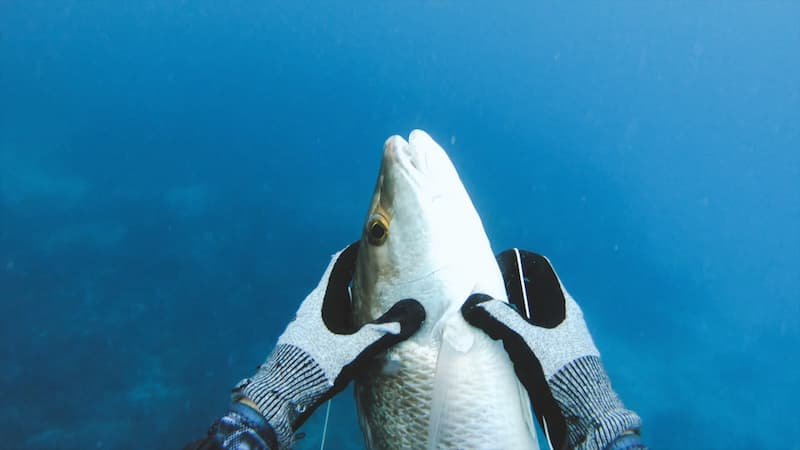
And like I said before, best option is right after you shoot the fish you swim up to it and you get that fish in your hands before you work your way towards the surface. But since that that is not always possible, especially with big fish or down deep when you need to get back up to get some air, your next best bet is going to be to lock down your drag on your reel. Don't let that fish take any line out. And when it comes to locking down drag my personal preference is that I actually leave my reel in free spool so I don't mess with the drag nut on my reel, instead I either grab my reel line and prevent it from sliding out that way, or I'll cut my hand over the reel. And the reason I like to do it this way is because there are a few scenarios where you might actually let your fish free spool to take out line and those scenarios would be right as your fish is about to get eaten by a shark, if you have the drag locked down super tight, that's going to make that fish it's going to make the fish swimming pattern you know very restriced, so it's not going to be able to defend itself and try swimming away. But if you can free spool in those little you know areas right there right when the shark's about to eat it that actually will help the fish give it the space it needs in order to get away from from the shark on its own. And then that will help you in turn.
Another reason you might want your gun to be free spooled is if you do ever get sharked it's always best to have line go out quickly as opposed to getting a reel jam where that might cause you to lose a spear gun. But for the most part locking down your reel will be huge because even if you can't get to the fish it helps your dive buddies get to your fish that much easier. Moving on, the next aspect of spear fishing around sharks I want to talk about is having a team oriented mindset with your dive buddies. And the primary thing here is everybody in the water is focused on landing each fish individually. This means that if my buddy just shot a fish I'm going to help him land a fish before I shoot another fish of my own. And this gets really complicated and it's really tempting especially when you have fish swimming right past you that you think you have an easy shot on, but the reality is is if you double up on fish, now the resources you have at the surface to help you land those fish are cut in half, and it's more likely that you're going to lose one or both of those fish to sharks. So, while you might end up shooting fewer fish if with this strategy what I promise you is you will actually land way more of the fish that you do shoot.
Another big part of a team oriented mindset with your dive buddies is going to be defensive diving. Because we're freediving we're limited on our ability to stay underwater, so I might shoot a fish and I might not have the breathhold to maintain a presence around that fish. So it's really helpful in those scenarios if I have somebody at the surface who's fresh, they're fully breathed up, to come down and help me maintain that presence in the water around the fish that I've just shot.
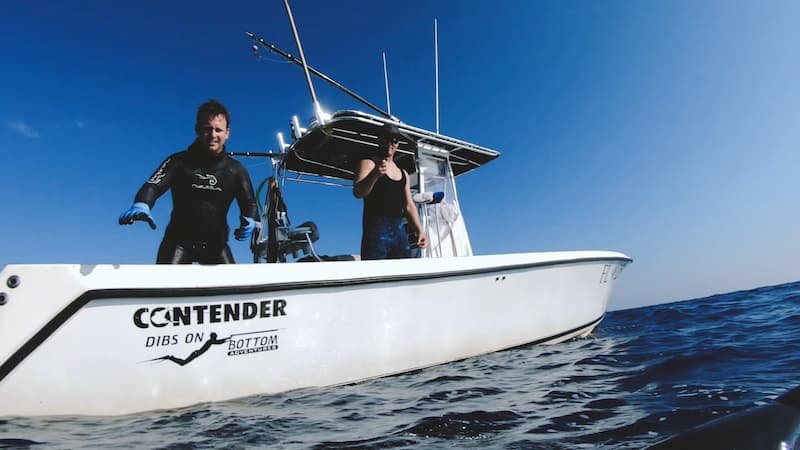
But what you have to understand now is if we have defensive divers, now we need more divers in the water, because everybody still has to have a safety. So what we've learned is that four divers is the golden number. If you have four divers you can run the system perfectly. And what that might look like in a real world situation with four divers is one diver is actively spearfishing, the other three divers are at the surface as support.
As soon as the spearfisher pulls the trigger and hits a fish, two of those three support divers at the surface will instantly start their dive. Diver one, the first of those support divers to go in the water, goes immediately to safety. Your only job as safety is to make sure that the diver who shot the fish gets to the surface safely and that once they're at the surface they recover safely. There you have no roles as far as keeping the fish. And what you do is by focusing primarily and only on the safety as the first diver is you give the second diver down peace of mind. So if I'm the second diver down I know the safety is covered now I feel a lot better about targeting that fish with all my mindset. I'm able to you know play defense around the fish, maintain that presence in the water, if I can get the fish in hand that's ideal, if I can't do that I'm just trying to stay close to the fish, or maybe I need to put a second shaft in the fish so we can rip it up twice as fast. Αnd now the fourth diver who we have yet to talk about, that diver is going to be the safety for the defensive diver. Αnd that's going to be super helpful especially in deep water because these defensive dives can be really demanding.
Not only are you starting defensive dives with little to no warning, you're literally starting as soon as your dive bu pulls the trigger on their spear gun. but these defensive dives are also just demanding because you're swimming hard and you're swimming fast after these fish way faster than you would ever swim on a normal freedive. So in some circumstances they can even feel like CO2 dives, so being able to have your own safety after a demanding dive like that is a huge aspect to being able to defensively dive well.
The next aspect I want to talk about when it comes to spear fishing around sharks is understanding the risks. And on some level prepare for those. So it's always a good idea to have a first aid kit, whether or not you are spearfishing around sharks or not, it's a good investment, but especially when we are spear fishing around sharks it's even better of an idea. It's an even better idea to go ahead make the investment and get a first aid kit.
I prefer dive knives that are, one, pointy on the tip and then, two, have at least one serrated edge. Both these knives here are examples of this, this knife right here has two serrated edges, this one only has one right here and then a straight edge over here. And the reason that I like the serrated edge over this regular straight edge is this straight edge will dull out really quickly. But meanwhile, the serrated edge will still maintain its ability to cut through line. So if you ever needed to cut your shaft free to prevent yourselves from losing a gun, or, God forbid, you or your dive buddies get tangled up in line you know you have a knife capable of cutting through that line. The other aspect to your knives is this pointy tip and the reason I like this pointy tip is it's a very easy way to quickly dispatch fish. If I have a fish flopping around at the surface or you know fighting for its life, not only does that make the meat taste a little bit worse but but it also excites the sharks a lot. So, the faster I can dispatch that fish, the quicker I'm going to get these sharks back to their normal behavior and a good sharp dive knife is huge for that.
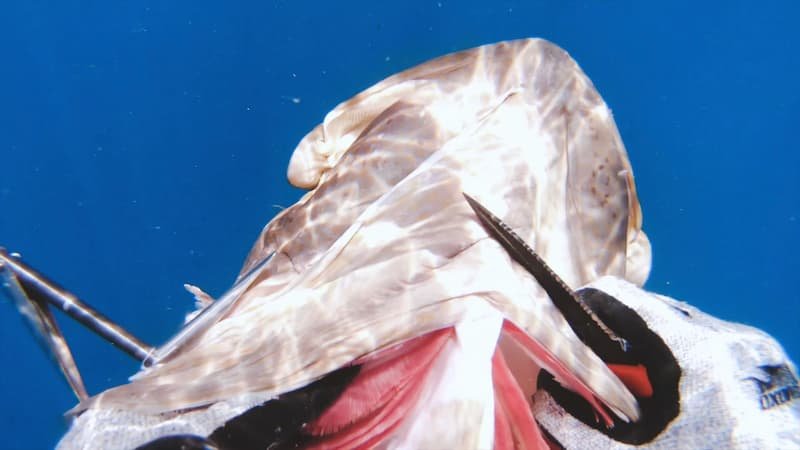
A couple of other things you may want to consider are the fact that you might lose gear when you're spearfishing around sharks, not only might you lose spear shafts when you get sharked, uh so I recommend packing extra spear shafts but you also might lose a spear gun. So help yourselves, be prepared, and prepare for the kind of worst case of losing gear. Pack a couple of extra spear shafts, that way if you lose one you're not done diving for the day. I also recommend throwing your contact information on your spear gun, and that way if it does get lost there's at least a little bit of a chance that it gets turned in back to you. You can do this many ways, you can either etch or draw your name on the spear gun, but what I personally do and have found super easy, is I go to the pet store and they have aluminum dog tags and a laser engraver right in the store, so I just print my contact information on one of those little pet tags, and then tie that onto the handle of my spear gun. After a certain point in time the sharks in your area are going to be too excited, they're going to be too keen on stealing your fish. And at that point, one of two things is going to happen, either it's going to be way too difficult to actually pull fish up past the Sharks, to the point where you're just going to be losing fish left and right, or you might even find yourselves in a situation where your safety is at risk, and if either of these scenarios occur, I recommend get back in the boat and switch spots. Now the good news here is the ocean is a huge place and just because the sharks are bad in one area, doesn't mean they're going to be bad at all of your dive spots. So this doesn't mean you're done diving for the day, this just means you know maybe we pack up and move half a mile or more away to a new dive spot and the hopes are that the sharks there are not going to be as aggravated.
Once again my name is Christian Daehler, I'm a PFI instructor in Palm Beach Florida and I hope these tips help you land fish more successfully when you're spearing around sharks.